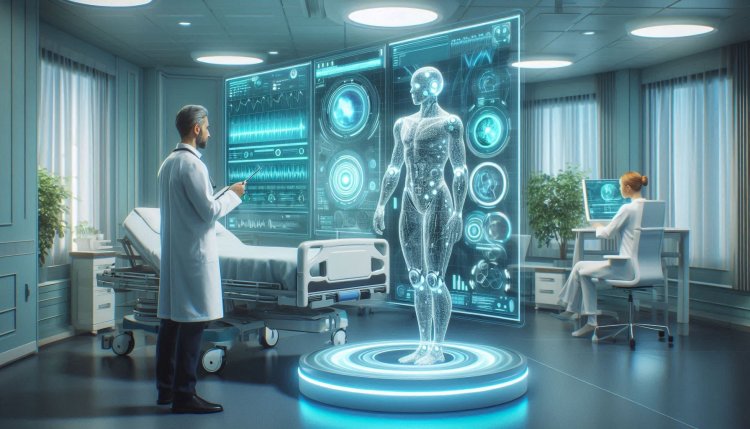AI in healthcare: Diagnosis and treatment
Revolutionize healthcare with AI for precise diagnosis and personalized treatment. Explore the future of medicine with AI in healthcare.

AI in Healthcare: Diagnosis and Treatment
Artificial Intelligence (AI) is revolutionizing the healthcare industry by enhancing the accuracy and efficiency of diagnosis and treatment processes. By leveraging machine learning algorithms and big data analytics, AI systems can analyze vast amounts of medical data to assist healthcare professionals in making more informed decisions. This has the potential to improve patient outcomes, reduce medical errors, and optimize resource utilization in healthcare facilities.
Diagnosis:
AI technologies are being used in healthcare for diagnosing various medical conditions, ranging from common illnesses to complex diseases. One of the key advantages of AI in diagnosis is its ability to process and analyze large volumes of medical images, such as X-rays, MRIs, and CT scans, with high accuracy and speed. AI-based imaging systems can help radiologists detect abnormalities and identify potential diseases at an early stage, leading to timely interventions and improved patient care.
Furthermore, AI-powered diagnostic tools can analyze patient data, including medical history, symptoms, and laboratory test results, to assist healthcare providers in making accurate diagnoses. By comparing this information with vast databases of medical knowledge and patient records, AI systems can generate differential diagnoses and recommend appropriate treatment options based on evidence-based guidelines.
Treatment:
AI is also transforming the way healthcare providers deliver treatment to patients. By analyzing clinical data and real-time patient monitoring, AI systems can personalize treatment plans and optimize medication dosages to meet individual patient needs. This personalized approach to treatment can improve patient outcomes and reduce the risk of adverse reactions to medications.
In addition, AI-powered decision support systems are helping healthcare professionals in selecting the most effective treatment options for patients. These systems can analyze patient data, medical literature, and treatment guidelines to recommend evidence-based interventions that are tailored to the specific needs of each patient. By integrating AI into clinical decision-making processes, healthcare providers can enhance the quality of care and ensure that patients receive the most appropriate treatments for their conditions.
Challenges and Considerations:
While AI has the potential to revolutionize healthcare, there are several challenges and considerations that need to be addressed to ensure its successful implementation. One of the main concerns is the ethical and legal implications of using AI in healthcare, particularly in terms of data privacy, security, and patient consent. Healthcare organizations must establish robust data governance frameworks and compliance mechanisms to protect patient information and ensure that AI systems adhere to regulatory requirements.
Another challenge is the need for healthcare professionals to be trained in using AI technologies effectively. Healthcare providers must be educated on how to interpret AI-generated recommendations and integrate them into their clinical decision-making processes. This requires ongoing training and professional development to ensure that healthcare professionals are equipped with the necessary skills to leverage AI for improving patient care.
Future Directions:
Looking ahead, the future of AI in healthcare holds great promise for transforming the way we diagnose and treat medical conditions. Researchers and industry experts are exploring innovative applications of AI, such as predictive analytics, virtual health assistants, and autonomous surgical robots, to further enhance the quality and efficiency of healthcare delivery.
Moreover, advancements in AI technologies, such as deep learning and natural language processing, are enabling more sophisticated applications in healthcare, such as disease prediction, drug discovery, and genomics analysis. These developments have the potential to revolutionize personalized medicine and usher in a new era of precision healthcare that is tailored to the unique needs of each patient.
Conclusion:
In conclusion, AI is playing a transformative role in healthcare by revolutionizing the diagnosis and treatment of medical conditions. By harnessing the power of machine learning and big data analytics, AI systems are augmenting the capabilities of healthcare professionals and improving patient outcomes. As we continue to explore the potential of AI in healthcare, it is essential to address the challenges and ethical considerations associated with its use and ensure that AI technologies are deployed responsibly to benefit patients and healthcare providers alike.
What's Your Reaction?

















